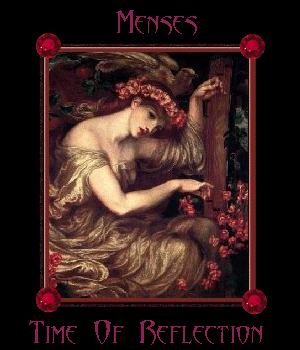
 Menstruation or Menses is an universal female experience. An experience, which, until a few years ago, was kept hushed and private in our Western culture. It is still, today, an experience that is not spoken of openly in mixed circles. Why has such a natural, common experience been kept secret and hidden in our culture, as well as many other cultures throughout the ages? Very few cultures have viewed menses as natural and beautiful, or as a sacred time. Yet, that is exactly what menses is - a sacred process, that women can learn to appreciate.
 Since Biblical times, women have been branded as "unclean" during their menses cycle. Separate quarters were assigned for women to retire to, while flowing - and public arenas were off-limits during this time. This image of "uncleanness" has persisted across many ages, causing women shame and confusion, and bringing disgust to those who by chance became aware that a woman was experiencing menses. The slang and jargon used, even today, to describe this natural cycle, speaks loudly of the historic and modern images issued by the thought of menstruation. "On the rag", "The Curse", "THAT time of the month," and so on, characterize menses as an inconvenience, an ordeal, and a shameful event. Historical literature contains many descriptions of problems that menstrual women could supposedly cause. At one time, people believed that a farmer's crops would not grow if a flowing woman walked through his fields; or that the dough would not rise, if she tried to bake bread during menses. Women were thought of as unclean and dangerous to their husbands, and were often made to sleep separately from him during her menses period. She had to cease flowing, then cleanse and purify herself before she could once again rejoin him in his bed

What Is Menses?Menarche can begin at any time between the ages of 10 to 17. Initially, the cycles are irregular, unpredictable, painless, and anovulatory in the majority of young girls. After a year or two, the ovary produces enough cyclic estrogen to make a mature and fertile ova.Every woman's cycle is unique, and usually becomes regularized. In some woman, periods occur every 23 days, in others, the cycle may occur every 32 days. The average length of a cycle from the beginning day of one cycle to the beginning day of the next cycle, is 28 days. Menstruation is periodic uterine bleeding that begins about 14 days after ovulation. The cycle usually lasts for about 5 days, with an average loss of 50 ml. of blood. The cycles continue throughout the entire child-bearing period, which ends, on average, in the woman's fifth decade of life. Menstrual cycles slowly taper off, until they cease altogether, with the onset of menopause. Again, menses is a natural common experience, and NOT a disease! For too long, people have viewed menses as an undesireable condition, one that makes a woman "sick" and "dirty."

Common Sensations of MensesSome women experience Dysmenorrhea, or painful uterine cramping, during the menses period. This discomfort is often relieved with heat, analgesics, rest and relaxation, and mild, enjoyable exercise.Often women will notice a swelling in their breasts up to a week before menses begins. Some may experience headaches, acne breakouts, and slight weight gain, due to water retention. Others may experience what is called Premenstrual Syndrome (PMS), characterized by irritability, depression, passivity, and fatigue.

Comfort MeasuresDuring your menses, try to relax and let yourself take it easy. If you must work, take frequent little rest periods, and feel the energy of your body.Drink plenty of fluids, especially herbal teas, juice, and fresh water. Wear comfortable, loose-fitting clothes, and cotton underwear. Get some fresh air, and breath deeply. If you experience painful menses, try some analgesics, and a hot pack at the small of your back. If you can, get someone to rub your feet, especially around your ankles and heels (pressure points for your ovaries and uterus). Eat plenty of fresh fruits and vegetables. Keep a journal and write down the insights you receive at this time. The Native Americans believed that women were in a time of power during menses. Take advantage of this spiritual spurt of energy to gain insights and self-knowledge. Practice good menstrual hygiene. Change your absorbent tampon, pad, or cup regularly to avoid toxic shock syndrome, and prevent bacterial growth. Take a daily warm or hot bath - add bath salts, or aromatherapy oils, light a candle, lie back, and dream away. Don't fall asleep though! Dialogue with other women about your menses experiences - make it a natural, and normal part of your life!

![[Back]](/images/rback.gif)
![[Email]](/images/remail.gif)
![[Home]](/images/rhome.gif)
![[Next]](/images/rnext.gif)
|